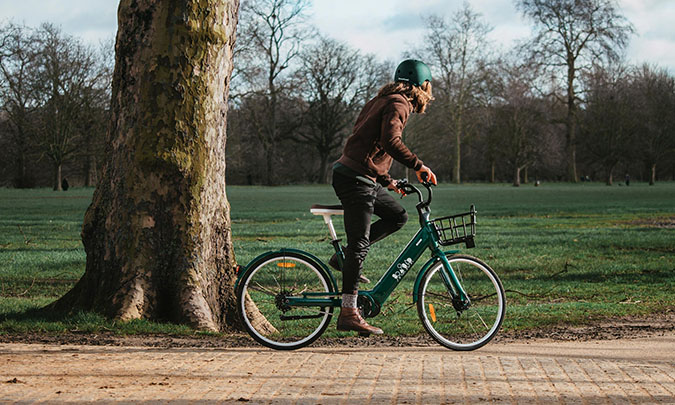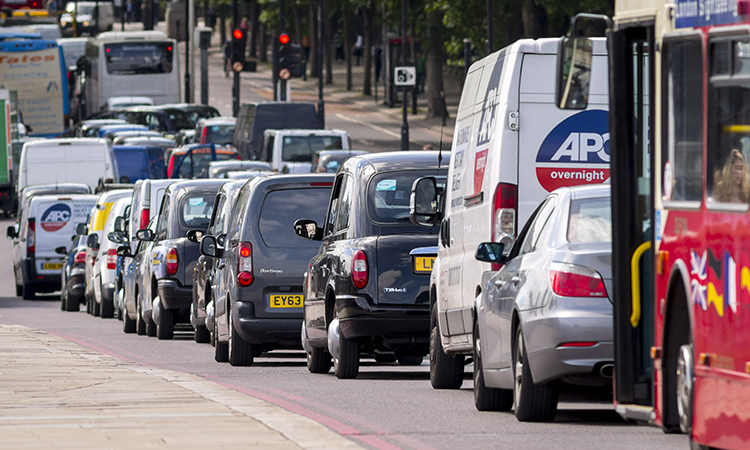HumanForest: the operator aiming to make e-bikes truly sustainable
- Like
- Digg
- Del
- Tumblr
- VKontakte
- Buffer
- Love This
- Odnoklassniki
- Meneame
- Blogger
- Amazon
- Yahoo Mail
- Gmail
- AOL
- Newsvine
- HackerNews
- Evernote
- MySpace
- Mail.ru
- Viadeo
- Line
- Comments
- Yummly
- SMS
- Viber
- Telegram
- Subscribe
- Skype
- Facebook Messenger
- Kakao
- LiveJournal
- Yammer
- Edgar
- Fintel
- Mix
- Instapaper
- Copy Link
Posted: 18 December 2020 | Agustin Guilisasti - HumanForest | No comments yet
HumanForest founder Agustin Guilisasti explains why his company is truly green, and reflects on some of the opportunities and challenges that come with building a new sustainable mobility solution in a city like London.


Credit: HumanForest
The founder of HumanForest, Agustin Guilisasti, believes his company is the only truly sustainable e-bike operator in London. Here, he outlines what makes HumanForest so green, and reflects on his experiences of setting up a mobility operator in one of the world’s busiest and diverse cities.
Why are HumanForest e-bikes the only truly sustainable e-bikes in London?
For us, helping improve the air quality of our cities is of utmost importance. We are currently in the process of being certified by ‘First Climate’ to ensure we are maintaining the highest sustainability standards possible.
Our e-bikes are unique in that they are powered fully by renewable energy and our operations are also sustainable with the emissions created in the production of the e-bikes being offset within only six weeks of the bikes being on the roads!
We also use an electric yute to move our e-bikes as well our team who manage and maintain the fleet (we call them ‘Gardeners’) across the city. We try to avoid moving the bikes as much as possible to increase our energy efficiency. Our warehouse (we call it ‘The Greenhouse’), is based in central London which helps limit our maintenance miles.
We’re also working on creating battery stations across London by repurposing London’s iconic telephone boxes by turning them into battery charging points and storage units! In time, we want users to be able to swap their own batteries in exchange for extra free minutes.
How difficult was it to implement such sustainability measures in London?
Congestion is a real problem in London and it makes implementing sustainability measures quite tricky, but that is the problem we are looking to solve! We try to do as much of the e-bike maintenance on the roadsides to limit having to move the bikes around the city and get caught up in the traffic.
We’ve also found renting space to build the warehouse is a big cost, particularly as we want to keep our Greenhouse centralised to limit the miles travelled during operations.
Finally, building a business during London’s lockdown has been difficult but also presented us with a great opportunity. The unpredictability of the pandemic has been hard to manage from a business perspective but we’ve also seen consumers’ habits and lifestyles changing which makes it a great time to offer a new, socially-distanced and sustainable mobility solution.
Why have you decided to choose London as the place to start?
I used to work in Chile for Cabify, the first mobility company to become carbon neutral. The Cabify team took a trip to the Amazon rainforest to visit a province called ‘Madre de Dios’. For me, it was a really life-changing experience. The magnitude and power of the rainforest really impacted me.
Shortly after, I moved to London to study for a Masters in Data Science. I found there was a real lack of affordable, last-mile mobility solutions. I wanted a way to quickly move across the city but I also wanted to avoid adding to London’s toxic air crisis. So the idea was inspired by a trip to the Amazon, but it was also motivated by needing a practical transport solution.
Since we launched the company, cycling in London is up 120 per cent and the government has announced a £2.5bn Cycling and Walking strategy to make cities more cycle-friendly. I really feel there is a huge opportunity in London for HumanForest.
-


HumanForest is hoping to relieve some of London’s congestion.
Has it been easy to work with London boroughs and TfL during your experience in Islington?
London is a very open and forward thinking city, making it a great place to launch a sustainably-minded company. Operationally, it’s also a great place to work. Cycling is already ingrained into many Londoner’s lifestyles and a lot of investment is being put into creating infrastructure like cycle superhighways. We also feel that London is a reference city in mobility, so it will make scaling easier when we expand internationally.
Having said that, the current patchwork approach to mobility across the different boroughs does make it a bit harder to get licenses to operate city-wide. Nevertheless, we haven’t had much trouble so far convincing boroughs that we will help their residents move efficiently and sustainably. In fact, we are yet to lose a single competitive tender process!
Most of all we are grateful to local authorities for their interest in making London more eco-friendly. We are really enjoying helping boroughs achieve their sustainability targets!
What are the future plans of HumanForest – have you any wish to expand into the e-scooter sector?
Our goal as a company is to provide affordable mobility in a sustainable way and we really feel e-bikes are the right product to offer that right now. We believe that e-bikes are much better placed than scooters to replace cars, which are the primary cause of air pollution in our cities.
However, we are always looking for innovative solutions which align with our vision, so never say never! In the near future we are more focused on expanding our e-bike geographically and we have plans to reforest another European city in 2022!
Biography
Originally from Chile, Agustin previously ran Cabify’s LATAM operations, helping it grow into Spain’s first unicorn and the first profitable ride-hailing app. On moving to London to complete a Masters in Data Science, he saw a lack of affordable mobility and an opportunity to offer a new type of shared e-bike; one which is truly green. Agustin passionately believes that in the same way that trees remove CO2 from the atmosphere, humans working together can improve the air quality in our cities.
Related topics
Alternative Power, Fleet Management & Maintenance, Mobility Services, Multimodality, On-Demand Transport, Sustainable Urban Transport
Related modes
Bikes & Scooters
Related cities
London
Related organisations
HumanForest, Transport for London (TfL)
Related people
Agustin Guilisati








